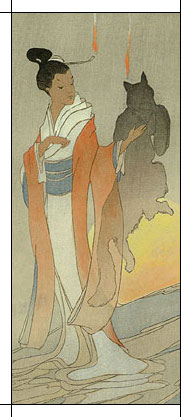
|
+ |
|
|
+ |
|
|
+ |
|
|
Western |
+ |
|
Vulpines |
+ |
|
+ |
|
|
+ |
|
|
That's not what they meant... |
+ |
|
Graves, roofs, and your own living room |
+ |
|
+ |
|
|
Where next? |
+ |
|
|
|

|
The False Concubine Cheng Yumen [Cheng Jinfang] also told of a certain traveller who took a concubine in Guangling [present-day Yangzhou, Jiangsu]. She was rather refined, being an adept at literary pursuits. The two, being extremely close to one another, enjoyed nuptial harmony in the boudoir. One day the traveller returned from a drinking bout, only to find the maids and servants already asleep, with not a candle lit in the darkness. There was a deep silence in the inner chambers, and he found a letter on the table, which read: "I was originally a vixen leading a solitary life amidst mountains and forests. For half a year I stayed with you to repay a debt I owed you previously. My karmic destiny having been fulfilled, I would not dare to linger any further. At first I intended to stay behind temporarily to take care of you, and to reveal why we were parting for good. Fearing, however, that our intense mutual devotion would make separation extremely difficult, in excruciating pain I decided to depart, rather than see you one more time. I looked back, bracing the wind; a thousand emotions beset me. who knows if, with such thoughts, I will not find my destiny further intertwined with yours on the Rock-of-Three-Lives?"* You should take good care of yourself, and not let your pure spirit be tarnished for the sake of one woman. If so, though I have to leave, I will feel slightly consoled." On reading the letter, the traveller was much distressed. When shown the letter, friends and old acquaintances all sighed with emotion. As similar events could be seen in ancient books and records, no one cast any doubt on the incident. A month or so later, the concubine and her lover showed their identities as they went north in a boat and were robbed. They reported the matter to government officials and waited for the robbers to be caught. When the two were detained for months inthis way in the Huai River area, the truth came out: The concubine's mother had sold her off at a high price, and so the concubine had to extricate herself by claiming to be a vixen. Zhou Shuchang [Zhou Yongnian] noted: "She was a vixen; how could there be talk of her being disguised as one? Many stories of the strange tell of human encounters with female fairies and immortals who eventually took their leave. I suspect that some of these might have belonged to the same category as this incident."
This 18th-century story appears in Ji Yun's Random Jottings at the Cottage of Close Scrutiny. Translation: Leo Tak-hung Chan, The Discourse on Foxes and Ghosts: Ji Yun and Eighteenth-Century Literati Storytelling. Honolulu: University of Hawai-i Press, 1998. Pp. 57-8. |